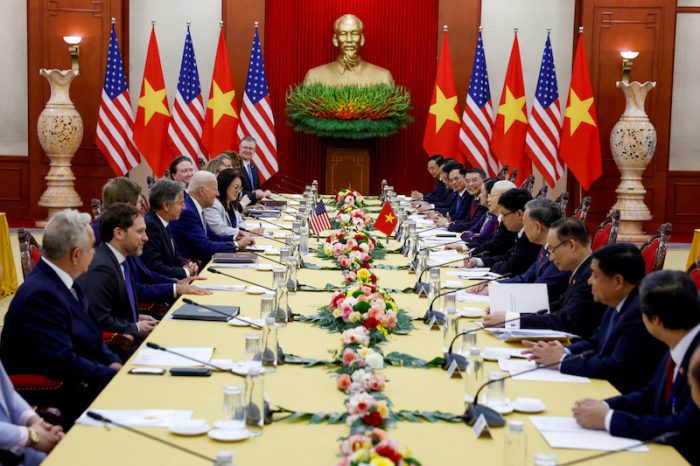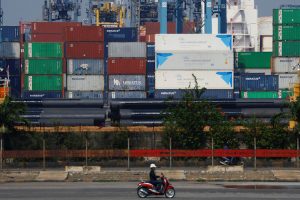Vietnam now has the fourth biggest trade surplus with the United States, according to figures released earlier this week.
The US trade deficit with the Southeast Asian industrial hub exceeded $110 billion in the first 11 months of 2024 – a rise of nearly 18% compared to the year before, largely because of a record fall of its currency against the US dollar.
The data puts the country, run by a Communist regime, behind only by China, the European Union and Mexico. And that is a worry for Hanoi, because it increases the risk of president-elect Donald Trump imposing tariffs of up to 20% per cent on all imports.
ALSO SEE: China’s Central Bank Seen Deploying Aggressive Monetary Policy
That risk has been compounded by a sharp fall of Vietnam’s dong in recent months, with the dong trading near its lowest ever levels against the US dollar.
Watch on currency manipulation
The trend is closely watched in Washington as Vietnam is one of the countries under scrutiny for potential currency manipulation.
Vietnam, which counts the US as its biggest market, is home to big export-focused industrial operations of US multinationals such as Apple, Google, Nike and Intel.
The latest seasonally adjusted trade figures show that in the January to November period, Vietnam accumulated a commercial surplus with the US of $111.6 billion, up from $94.8 billion in the same period in 2023. Unadjusted data pointed to a larger gap of $113.1 billion.
In November, the trade gap expanded by another $11.3 billion, accelerating from October, as Vietnam’s exports to the US rose, the adjusted data show, possibly supported by the weak dong.
“If the US perceives that Vietnam is deliberately keeping the dong weak to gain an unfair trade advantage, it could trigger renewed accusations of currency manipulation,” Leif Schneider, head of international law firm Luther in Vietnam, said.
Trump ended his first term in the White House with Treasury declarations of Vietnam and Switzerland as currency manipulators over their market interventions to weaken the value of their currencies.
Vietnam’s central bank has said it was ready to intervene in the foreign exchange market in case of adverse economic impacts from currency moves, and has sold US dollars in the past to strengthen the dong.
On Tuesday, before new trade figures were released, the bank said it would monitor Trump’s policies and adjust accordingly.
The dong’s most recent depreciation against the US dollar is broadly in line with other major currencies.
- Reuters with additional editing by Jim Pollard
ALSO SEE:
Trump May Declare National Economic Crisis For New Tariffs: CNN
Vietnam Seen Facing Tariffs as Trade Surplus With US Soars
Vietnamese Tycoon ‘Must Repay Billions to Avoid Execution’
Vietnam to Build High-Speed North-South Rail Link – BT
Chipmakers Flee China, Shift to Vietnam Amid US-China Heat
Vietnam Leader To Lam in China For Rail, South China Sea Talks
Vietnam Enjoys Big Jump in Exports, Industrial Production
Vietnam’s Massive Saigon Bank Bailout Rises to $24.5 Billion
US Chip Firms Looking to Invest $8bn in Vietnam, Official Says
Vietnam Growth Slips on Exports Drop, Anti-Corruption Push
Xi’s Vietnam Visit Set to See Rail, Tech Cooperation Deals
Chinese Investment in Vietnam Doubles, As US Trade Eases
























